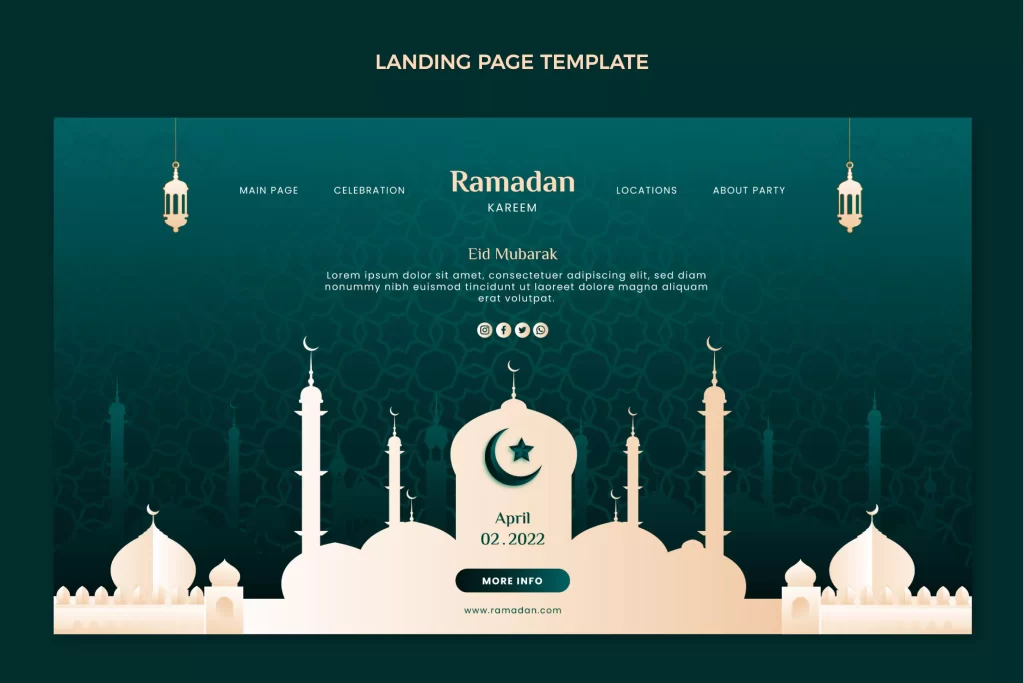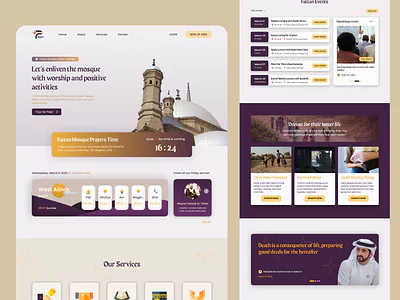In today’s digital age, a well-designed and functional website is essential for any organization, including mosques. A masjid website serves as a central hub for the community, providing important information, updates, and resources. It’s more than just a digital presence; it’s a tool for communication, education, and outreach. Whether you’re looking to create a new website or enhance an existing one, certain features are critical to ensure that the site meets the needs of your congregation and broader community. This article outlines the top features every mosque website should have, incorporating halal digital solutions and effective halal marketing strategies to engage and support the Muslim community.
- User-Friendly Navigation
- Prayer Times and Calendar of Events
- Online Donation and Fundraising Tools
- Educational Resources and Islamic Content
- Community Services and Programs
- Mobile Responsiveness
- Multilingual Support
- Secure and Private User Experience
- Integration with Social Media
- Contact Information and Support
- Conclusion:
User-Friendly Navigation
One of the most important features of any website, including those for mosques, is user-friendly navigation. A masjid website should be easy to navigate, with a clear and logical structure that allows users to find the information they need quickly. This includes having a well-organized menu, clear headings, and an intuitive layout.
For example, the homepage should offer easy access to essential sections such as prayer times, events, and contact information. Additionally, it should include links to other important pages like Islamic resources, community services, and donation options. By ensuring that your website is easy to navigate, you help users find what they need without frustration, thereby enhancing their overall experience.
Prayer Times and Calendar of Events
A key feature of any mosque website is the inclusion of accurate and regularly updated prayer times. This is one of the most frequently accessed pieces of information on a masjid website, as community members rely on it to perform their daily prayers on time. The prayer times should be displayed prominently on the homepage, with options to view times for the entire week or month.
In addition to prayer times, a comprehensive calendar of events is essential. This calendar should include all upcoming events, classes, lectures, and community activities hosted by the mosque. Integrating a dynamic calendar feature that allows users to add events to their personal calendars or receive notifications can significantly increase engagement.

Online Donation and Fundraising Tools
Fundraising is a crucial aspect of mosque operations, and having effective mosque fundraising ideas integrated into the website can make a significant difference. An online donation platform allows members of the community to contribute to the mosque’s funds easily and securely. The donation page should be simple to navigate, with multiple payment options, including credit/debit cards, PayPal, and bank transfers.
Moreover, the website can incorporate specific fundraising campaigns or halal marketing strategies to support various projects, such as building renovations, community outreach programs, or educational initiatives. By making the donation process straightforward and accessible, the mosque can encourage more frequent and generous contributions from its members.
Educational Resources and Islamic Content
Providing educational resources is another essential feature for a mosque website. This can include a wide range of Islamic content, such as articles, videos, and lectures on various topics related to faith, spirituality, and daily living. Having a dedicated section for Islamic content helps the community stay informed and deepens their understanding of the religion.
Furthermore, offering downloadable resources, such as Quranic verses, Hadiths, or prayer guides, can be beneficial for users who want to learn more about Islam at their own pace. These resources should be regularly updated and curated to ensure they remain relevant and beneficial to the community.
Community Services and Programs
A mosque is not just a place of worship; it is a center for community support and services. The masjid website should highlight the various community services offered, such as counseling, marriage services, educational programs, and youth activities. This section should provide detailed information about each service, including how to register or participate.
Additionally, showcasing community programs that address social issues, such as food distribution, refugee support, or interfaith dialogue, can help foster a sense of unity and purpose within the community. By promoting these services on the website, the mosque can reach a wider audience and encourage greater participation in community initiatives.
Mobile Responsiveness
With the increasing use of smartphones and tablets, ensuring that your website design for masjid is mobile-responsive is critical. A mobile-responsive website adjusts its layout and content to fit different screen sizes, providing a seamless experience for users regardless of the device they use.
A mobile-friendly masjid website ensures that all features, including prayer times, event calendars, donation forms, and educational content, are easily accessible on smaller screens. This is particularly important for users who rely on their phones to access information on the go. By prioritizing mobile responsiveness, you ensure that your website is accessible and user-friendly for all members of the community.
Multilingual Support
Given the diverse nature of many Muslim communities, offering multilingual support on a mosque website is a valuable feature. This allows users who speak different languages to access information in their preferred language, making the website more inclusive and welcoming.
Implementing multilingual support involves translating key content, such as prayer times, event details, and educational resources, into the languages most commonly spoken within the community. This can be achieved using translation plugins or by creating separate language-specific pages. Providing multilingual support not only enhances the user experience but also reflects the mosque’s commitment to serving all members of the community.
Secure and Private User Experience
Security and privacy are paramount when it comes to managing a mosque website, especially when handling sensitive information such as donations and personal details. The website should employ robust security measures, including SSL certificates, secure payment gateways, and data encryption, to protect users’ information.
Furthermore, ensuring that the website complies with data protection regulations and offering clear privacy policies can build trust with users. Regular security audits and updates are essential to maintaining a safe online environment for all visitors.

Integration with Social Media
Incorporating social media integration into the professional websites for masjids is an effective way to extend the mosque’s reach and engagement. Social media platforms like Facebook, Instagram, and Twitter can be used to share updates, events, and educational content with a broader audience.
The website should include social media buttons that link directly to the mosque’s official profiles, allowing users to follow, like, or share content easily. Additionally, embedding social media feeds on the website can keep visitors informed of the latest news and activities, encouraging more interaction and participation.
Contact Information and Support
Providing clear and accessible contact information is another essential feature of a mosque website. This includes the mosque’s address, phone number, email, and a contact form that allows users to reach out with questions or requests. Having a dedicated support section or live chat feature can also enhance user experience by providing immediate assistance when needed.
The contact information should be prominently displayed on the homepage and on a separate contact page to ensure users can find it easily. Additionally, providing directions via Google Maps or offering information on public transportation options can help visitors plan their trip to the mosque more efficiently.
Conclusion:
Building an Effective Mosque Website A mosque website is a vital tool for connecting with the community and supporting its spiritual and social needs. By incorporating features such as user-friendly navigation, accurate prayer times, online donation tools, educational resources, and mobile responsiveness, mosques can create a comprehensive and accessible online presence. Furthermore, integrating halal digital solutions and halal marketing strategies can help promote the mosque’s activities and initiatives more effectively.



